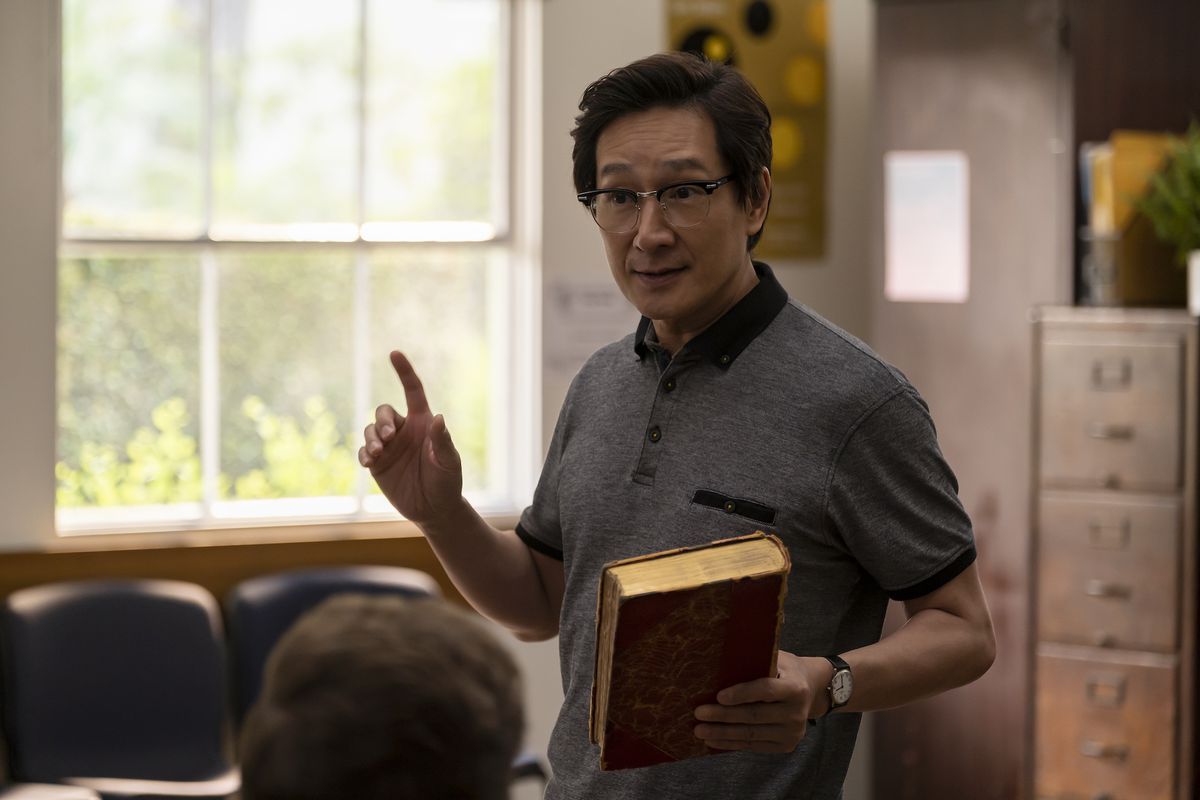American Born Chinese, the graphic novel by Gene Luen Yang, is a near-universally lauded, surreal graphic novel about a Chinese American kid who’s deeply embarrassed to be Chinese. So it’s not surprising if fans — myself included — were a little skeptical of trailers for American Born Chinese, the television show on Disney Plus.
Footage from the show has fronted action scenes and a battle between the mortal world and heaven, seeming to play on the enormous success of Everything Everywhere All at Once (to be fair, the show does borrow almost the entire cast of the Best Picture winner). It’s a choice that feels disconnected from the story of Jin Wang, high schooler with a lot to learn about himself and the racist discomfort he’s both trapped by and clinging to. American Born Chinese, the graphic novel, has elements of the fantastical, but they’re… actually, what they are is kind of complicated. They’re not a kung fu action fight for the fate of the world, that’s for sure.
But having seen a few episodes of American Born Chinese, the TV show, ahead of its debut, I can say confidently that there’s more to the adaptation than meets the eye. And what I’ve seen so far is more than enough to get excited about.
Image: Carlos Lopez-Calleja/Disney
The most “challenging” aspect of American Born Chinese, the graphic novel, is also what has made it so thought-provoking a read. It’s not simply the story of Jin Wang, high schooler, tanking his relationship with his best friend in order to gain in-group status with the white kids. Yang’s graphic novel presents two other stories simultaneously: one about the early life of the Monkey King, Sun Wukong, and one that is a fictionalized American sitcom about a white American teenager and his embarrassing cousin, Chin-Kee, a comprehensive collection of the most pernicious Western stereotypes of Chinese men.
None of these stories appear to have anything to do with each other until the final scenes of the book; even then, it’s never entirely clear whether the Monkey King’s story or the sitcom are as “real” as Jin Wang is. The book works because each of the stories reflects its themes of dreaming of a transformation of identity demanded by outside prejudice, and it works regardless of what was really real.
But Yang’s experimentations with the diegesis — with different cartooning and layout styles on the page, and clear chapter breaks — doesn’t translate one-to-one to TV aimed at all ages. The “reality” of live-action television can’t replicate the hyperreality of cartooning. At the same time, live action sharpens a lot of heavy content into painfully clear resolution. In the graphic novel, Yang’s depiction of cousin Chin-Kee is uncomfortable (as it should be!). In live action, the buck-toothed, pidgin-speaking, queue-wearing stand-in for racism directed at Chinese Americans would be unbearable.
Fortunately, the first few episodes of American Born Chinese shows a remarkable understanding of how to keep the spirit of a story while it’s retrofitted for another medium and modern audience of young viewers. No, the show doesn’t maintain the ambiguity of “realness” that the book does — Jin does eventually find out that his new friend Wei-Chen is the runaway son of the Monkey King, though it takes a few episodes before that shoe drops for him.
But there is still a Cousin Chin-Kee in the show updated for the sitcom language of Friends-era television. In a frankly brilliant bit of metatextuality, Ke Huy Quan plays an actor who used to play a broad Asian butt-of-the-joke character on a ’90s sitcom that’s seeing new relevance with The Youth after his pratfalls become a TikTok meme.

Image: Carlos Lopez-Calleja/Disney
“Isn’t that kind of problematic?” one teen asks another as they laugh at yet another video of his accented catchphrase, “What could go wong?” — right before they ask Jin, the Asian person who happens to be standing next to them, to tell them it’s OK to laugh. Jin doesn’t object, not necessarily because he doesn’t want to, but because he desperately cares to make everyone think he’s a fun and chill guy to hang out with.
It’s a tableau that could have easily played out in the book, if the book hadn’t been published in 2006, when social media and the widespread use of “problematic” were undreamt of. Here in 2023, they’re vital attributes of how race and racism are communicated in the life of an American teen — and American Born Chinese is smart enough to recognize it.
A few episodes in, American Born Chinese feels clever, modern, serious, and funny all together. A lot of that is delivered through the significant talents of young actors Ben Wang and Jim Liu (as our leads Jin and Wei-Chen, respectively). And that could be all it needs to be just as good as its source material. If audiences come for Everything Everywhere All at Once but stick around for a coming-of-age story equally as trenchant as American Born Chinese, the book, then, hey — that’s the art of adaptation at its finest.

